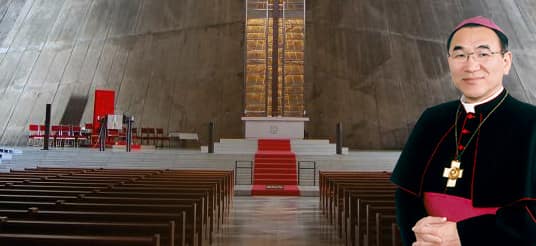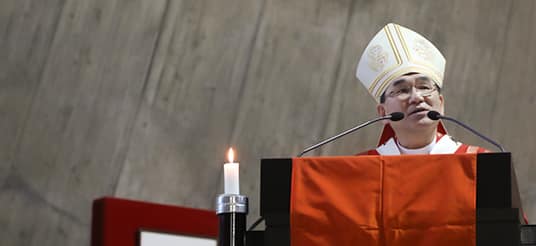Archdiocese of Tokyo

From the Archbishop’s Speech at the Cologne Seminary
28th May, 2004 Collegium Albertinum, Bonn
The necessary and important elements for priestly formation are well expounded upon in Pope John Paul II’s Apostolic Exhortation ‘The Formation of Priests in the Circumstance of the Present Day’ (Pastores dabo vobis). All of us, seminarians, staff members, and those with responsibility for priestly formation must learn form these guiding principles. So I ask you to please avail of these important guidelines.
1. Man of Prayer
A priest must be a man of prayer. At this stage it must be uppermost in your mind to get ready for a life of daily prayer. First of all, you must place great importance on daily mass, as well as acknowledging the importance of the Divine Office. Its goes without saying for the Mass, but also for the Divine Office, it is preferable if it is possible that these are not performed alone, but are celebrated together as a community. Meditation, solitary prayer, quiet reflection before the Eucharist and other types of prayer are all of importance for the priest and are not to be discarded.
2. Man of the Community
The priest is one who mediates between God and people, and between people in the assembly. The priest, through sharing in the priestly ministry of Jesus Christ the High Priest, presides at the liturgy. Also through serving people, the priest endeavors to unite them to our Lord Jesus Christ. Therefore the priest must be a person who with great patience can listen to the voice of the people. Rather than unilaterally talking about what he thinks is important, I think the priest should have the generosity and the willingness to be able to open up to what people are thinking and feeling. In no way is his authority to be used to overpower people. I ask for priests who are gentle, humble, kind and willing to serve others.
3. Man of receiving and giving
Today’s economy relies on consumerism. Taking every opportunity, corporations work hard to fan this consumerism among people. There is a serious temptation here. It can happen that we are overpowered by the temptation to place economic values ahead of the values of the ‘Kingdom of God’. We, the Church, have been entrusted with the goods of the earth. And each one of us are being asked, ‘How are do we use these goods? How are we responding to the expectations of God? How good are we at following in the way of Christ?’





